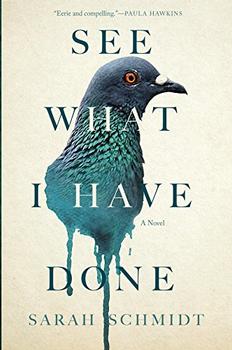Reading Guide Questions

Please be aware that this discussion guide will contain spoilers!
- The novel opens with an excerpt from a poem by Emily Dickinson: "We outgrow love like other things / And put it in a drawer." Do you agree with this idea? Why, or why not? How does it help to shape the story? Why do Schmidt's characters outgrow love, and how do they handle that loss?
- We're first introduced to Lizzie with an excerpt from her real-life inquest testimony. Talk about what this immediately reveals about Lizzie, and how this sets the tone for the novel that follows.
- The book's central mystery is based on an actual murder. Were you familiar with the crime? If not, did you stop at some point and research the case? Discuss whether your reading of the novel was affected by knowing that it was inspired by a true story. What are some pleasures and drawbacks of reading historical novels? Talk about why it is or isn't important for the author to achieve an accurate portrayal of historical events.
- Consider the importance of the title, See What I Have Done. Who is the "I" in the title? Do you think the person is confessing, or merely calling attention to their actions?
- How does the novel regard one's relationship with the father? Find examples of how various characters are defined by their fathers.
- Bridget says to Mrs. Borden and Emma about their home: "this place is no good." Think about the ways Schmidt makes the Borden house an unsettling, suffocating presence, always looming in the background. Do you think the house could be considered a distinctive character in the novel?
- What affect does John's arrival have on the Borden home? Examine the similarities and differences in his relationships with Lizzie, Emma, Bridget, and Mr. Borden. Discuss the range of family dynamics occurring in the household. How is family defined, and redefined, by each character?
- Look at Benjamin's role in the story. "Some men scare easy, some men are the scare. I knew what I was" (p. 70). What was he exactly? Talk about his multiple functions in the narrative. Why did the author choose Benjamin to be the last person Lizzie interacts with in 1905?
- Analyze what Lizzie's pigeons symbolize as they appear throughout the novel. Discuss how they further illustrate her character. What does Andrew's act of violence against the pigeons reveal about his character?
- Compare Lizzie, Emma, Bridget, Benjamin, and John's reactions to Mr. and Mrs. Borden's death. In what ways do the murders affect each of them personally?
- Identify some of the causes for sibling rivalry between Emma and Lizzie. How do the sisters attempt to define and differentiate their identities? How does Mr. Borden create and contribute to the tension between his daughters? Do you think Mr. Borden treated them unfairly?
- Mrs. Borden is unable to have her own children. Examine her relationship with her stepdaughters as well as with Bridget. Does she have maternal qualities? Why, or why not?
- Discuss Schmidt's portrayal of the class divide, as well as its impact on the immigrant experience in Fall River. Look at how the Borden family, Bridget, Benjamin, and others are characterized by their class status.
- Lizzie refers to herself as a "perpetual child" (p. 233). What do you make of this statement? How does she exhibit a childlike nature, and do you think this behavior makes her an unreliable narrator?
- Mr. Borden says to Emma, "You have a slow brain for facts" (p. 289). What exactly does he mean? Find instances of this throughout the novel. How does Emma's blindness to facts prevent her from making the right decisions?
- Consider the role of religious faith in the novel. Is faith important to Lizzie? Analyze Lizzie's favorite prayer: "As the lord liveth there shall no punishment happen to thee for this thing." Why does this resonate with her? How does it relate to the events of the story?
- Examine the theme of sexuality, and discuss how it affects these characters. What conflicts are created by sexuality, and how do the characters react?
- Schmidt frames the novel by creating distinct voices for multiple narrators. Did this technique enrich your understanding of the story? Who did you trust the most? Who did you think was complicit, and why did they choose to be complicit?
- The ending of the novel seems purposefully ambiguous. Why does Schmidt leave it up to the reader to be the juror? Did you feel that the conclusion ultimately confirms Lizzie's innocence or guilt? Explain.
- Talk about the function of the timeline, and how the chronology of See What I Have Done differs from the actual chronology. What does the excerpt from the last will and testament reveal about Lizzie and Emma's relationship later in life?
Suggestions for Further Reading:
Burial Rites by Hannah Kent
Little Deaths by Emma Flint
Field of Blood by Denise Mina
The Stars Are Fire by Anita Shreve
Dead Letter by Caite Dolan-Leach
Ill Will by Dan Chaon
Do Not Become Alarmed by Maile Meloy
Final Girls by Riley Sager
Unless otherwise stated, this discussion guide is reprinted with the permission of Grove Press.
Any page references refer to a USA edition of the book, usually the trade paperback version, and may vary in other editions.

 Book Reviewed by:
Book Reviewed by:





